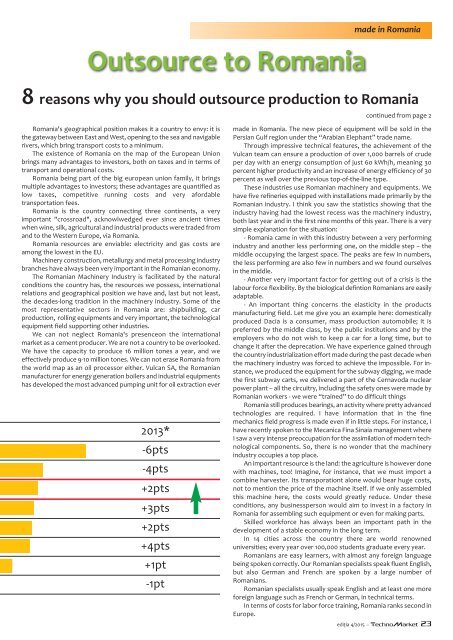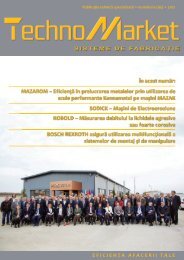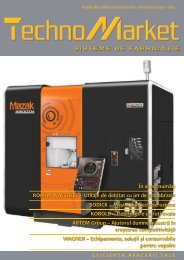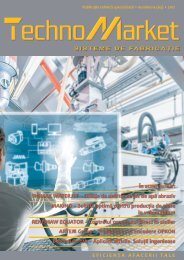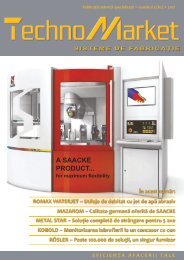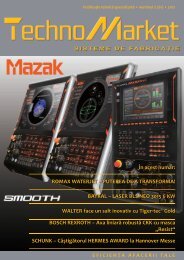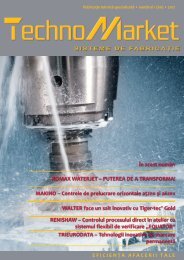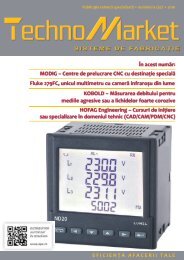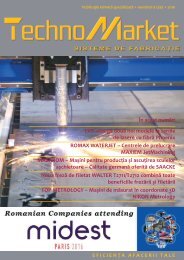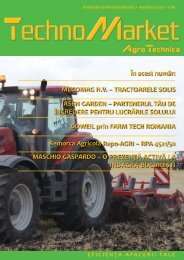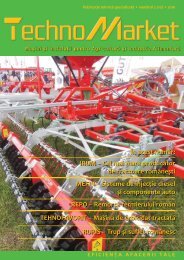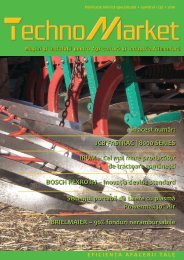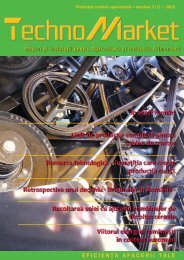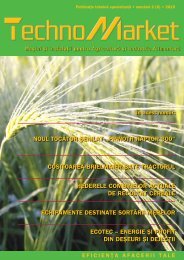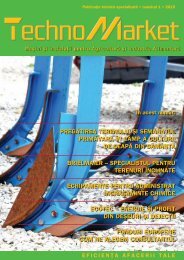Technomarket Agrotechnica nr. 8
You also want an ePaper? Increase the reach of your titles
YUMPU automatically turns print PDFs into web optimized ePapers that Google loves.
Outsource to Romania<br />
made in Romania<br />
8 reasons why you should outsource production to Romania<br />
continued from page 2<br />
Romania's geographical position makes it a country to envy: it is<br />
the gateway between East and West, opening to the sea and navigable<br />
rivers, which bring transport costs to a minimum.<br />
The existence of Romania on the map of the European Union<br />
brings many advantages to investors, both on taxes and in terms of<br />
transport and operational costs.<br />
Romania being part of the big european union family, it brings<br />
multiple advantages to investors; these advantages are quantified as<br />
low taxes, competitive running costs and very afordable<br />
transportation fees.<br />
Romania is the country connecting three continents, a very<br />
important "crossroad", acknowlwedged ever since ancient times<br />
when wine, silk, agricultural and industrial products were traded from<br />
and to the Western Europe, via Romania.<br />
Romania resources are enviable: electricity and gas costs are<br />
among the lowest in the EU.<br />
Machinery construction, metallurgy and metal processing industry<br />
branches have always been very important in the Romanian economy.<br />
The Romanian Machinery Industry is facilitated by the natural<br />
conditions the country has, the resources we possess, international<br />
relations and geographical position we have and, last but not least,<br />
the decades‐long tradition in the machinery industry. Some of the<br />
most representative sectors in Romania are: shipbuilding, car<br />
production, rolling equipments and very important, the technological<br />
equipment field supporting other industries.<br />
We can not neglect Romania's presenceon the international<br />
market as a cement producer. We are not a country to be overlooked.<br />
We have the capacity to produce 16 million tones a year, and we<br />
effectively produce 9‐10 million tones. We can not erase Romania from<br />
the world map as an oil processor either. Vulcan SA, the Romanian<br />
manufacturer for energy generation boilers and industrial equipments<br />
has developed the most advanced pumping unit for oil extraction ever<br />
2013*<br />
‐6pts<br />
‐4pts<br />
+2pts<br />
+3pts<br />
+2pts<br />
+4pts<br />
+1pt<br />
‐1pt<br />
made in Romania. The new piece of equipment will be sold in the<br />
Persian Gulf region under the “Arabian Elephant” trade name.<br />
Through impressive technical features, the achievement of the<br />
Vulcan team can ensure a production of over 1,000 barrels of crude<br />
per day with an energy consumption of just 60 kWh/h, meaning 30<br />
percent higher productivity and an increase of energy efficiency of 30<br />
percent as well over the previous top‐of‐the‐line type.<br />
These industries use Romanian machinery and equipments. We<br />
have five refineries equipped with installations made primarily by the<br />
Romanian industry. I think you saw the statistics showing that the<br />
industry having had the lowest recess was the machinery industry,<br />
both last year and in the first nine months of this year. There is a very<br />
simple explanation for the situation:<br />
‐ Romania came in with this industry between a very performing<br />
industry and another less performing one, on the middle step – the<br />
middle occupying the largest space. The peaks are few in numbers,<br />
the less performing are also few in numbers and we found ourselves<br />
in the middle.<br />
‐ Another very important factor for getting out of a crisis is the<br />
labour force flexibility. By the biological defintion Romanians are easily<br />
adaptable.<br />
‐ An important thing concerns the elasticity in the products<br />
manufacturing field. Let me give you an example here: domestically<br />
produced Dacia is a consumer, mass production automobile; it is<br />
preferred by the middle class, by the public institutions and by the<br />
employers who do not wish to keep a car for a long time, but to<br />
change it after the deprecation. We have experience gained through<br />
the country industrialization effort made during the past decade when<br />
the machinery industry was forced to achieve the impossible. For instance,<br />
we produced the equipment for the subway digging, we made<br />
the first subway carts, we delivered a part of the Cernavoda nuclear<br />
power plant – all the circuitry, including the safety ones were made by<br />
Romanian workers ‐ we were “trained” to do difficult things<br />
Romania still produces bearings, an activity where pretty advanced<br />
technologies are required. I have information that in the fine<br />
mechanics field progress is made even if in little steps. For instance, I<br />
have recently spoken to the Mecanica Fina Sinaia management where<br />
I saw a very intense preoccupation for the assimilation of modern technological<br />
components. So, there is no wonder that the machinery<br />
industry occupies a top place.<br />
An important resource is the land: the agriculture is however done<br />
with machines, too! Imagine, for instance, that we must import a<br />
combine harvester. Its transporationt alone would bear huge costs,<br />
not to mention the price of the machine itself. If we only assembled<br />
this machine here, the costs would greatly reduce. Under these<br />
conditions, any businessperson would aim to invest in a factory in<br />
Romania for assembling such equipment or even for making parts.<br />
Skilled workforce has always been an important path in the<br />
development of a stable economy in the long term.<br />
In 14 cities across the country there are world renowned<br />
universities; every year over 100,000 students graduate every year.<br />
Romanians are easy learners, with almost any foreign language<br />
being spoken correctly. Our Romanian specialists speak fluent English,<br />
but also German and French are spoken by a large number of<br />
Romanians.<br />
Romanian specialists usually speak English and at least one more<br />
foreign language such as French or German, in technical terms.<br />
In terms of costs for labor force training, Romania ranks second in<br />
Europe.<br />
ediţia 4/2015 – <strong>Technomarket</strong> 23


